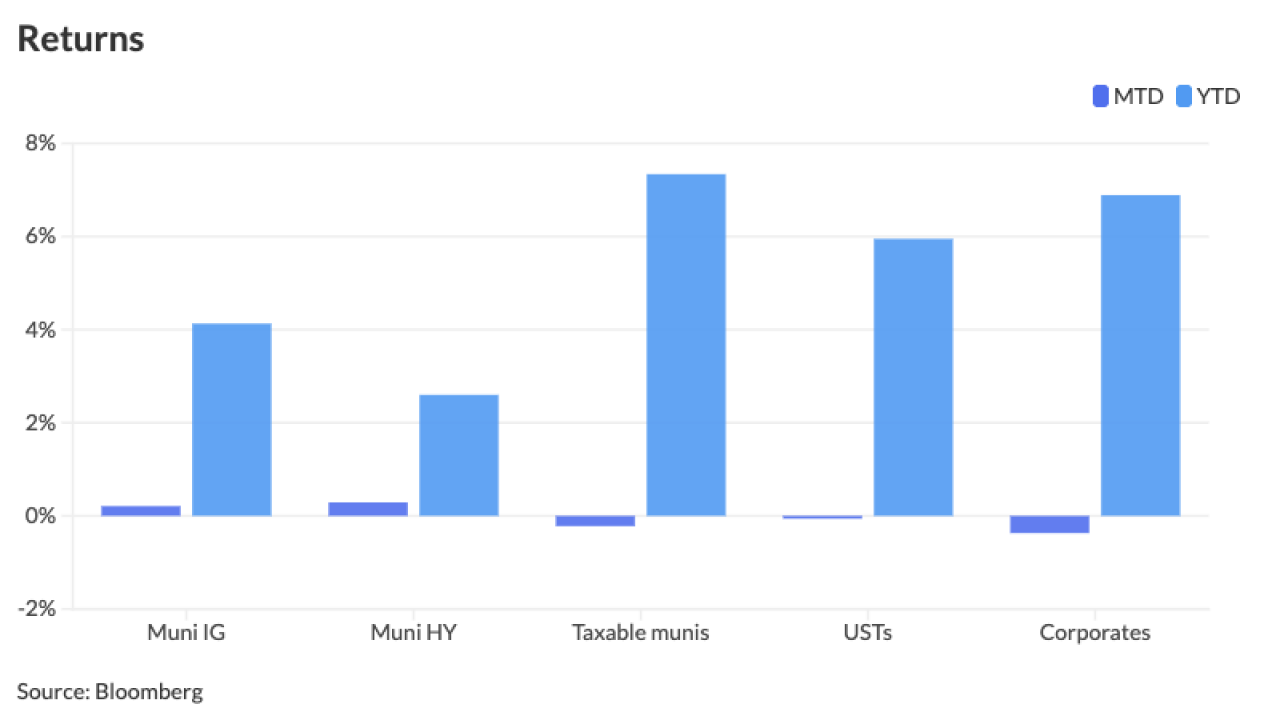Rates will stay low, issuance will soften to end the year but tick back up in 2021, and the municipal market still has room to grow in environmental, social, governance space relative to the global market.
Those were the takeaways from an S&P Global Ratings-sponsored Live Market Survey at The Bond Buyer’s California Public Finance Conference Wednesday.
“It’s hard to imagine a scenario in which rates could go lower” and they’re very unlikely to go up, said Shawn Dralle, executive director, public finance at UBS. “What’s 2020 taught us? Nothing is predictable.” Though, “the market has been incredibly resilient and the buy side has been able to absorb all this volume.”

Dralle and other panelists at The Bond Buyer’s California Public Finance virtual conference do not see that slowing in 2021. Nearly 50% of respondents to the question of will rates remain “very” low and issuance continue to grow, especially taxables, answered yes.
The taxable municipal market continues to be an opportunity, said Managing Director of Public Finance at MUFG, Nick Boyle. For double-AA, single-A municipal taxable credits, the spread still is about 20 to 25 basis points higher than where an investor would purchase a comparable corporate, noting that issuers and bankers need to sell the taxable muni story.
“There is still a lot of work to do," Boyle said. I think this trend will continue into next year. There are good quality names out there that could trade a lot tighter to where corporates” are trading currently, he said.
With supply potentially backing off to end the year, issuers will have the opportunity to ramp up in 2021, panelists said, with investors having a lot of cash to put to work.
“As an overall comment, it’s been incredibly impressive seeing how the market has responded to the pandemic. The money coming into the funds … it doesn’t want to let up,” said Rick Kolman, head of muni securities at Academy Securities. “I have no reason to think it is going to change much as we go into 2021.”
While budgets will likely come under pressure in 2021 as issuers release tax collection data mid-summer 2021, panelists agreed that issuers will weather the storm.
Liquidity was going to be the name of the game, Dralle said, adding that every ratings report noted the importance of liquidity, which the municipal market has provided in 2020. “The liquidity factor has been key in rating and non-rating actions.”
Boyle added that third-party liquidity, demand for revolving lines of credit for issuers, if conservatively managed, “it can really boost credit profile of a particular issuer.”
He noted that if the issuer was holding those lines as a backstop and not spending it for capital needs, they were in a better place.
“It’s not the avalanche that one would have anticipated in early April,” Boyle said. On a strategic basis, issuers are on-loading lines of credit to be sure they were flush in times when revenues drop.
He did note scoop and toss strategies, such as done in Chicago, are a "sign of desperation."
Boyle noted the Fed’s Municipal Liquidity Facility should be considered a third-party institutional liquidity provider, but one that has been “very effective for its lack of deployment.” It’s like a “fireside chat for the muni market without a president.”
Meanwhile, on the question of the most important effect on the market in the next six months, the majority of respondents said the outcome of the elections will be more important than rating changes, credit spread volatility, federal legislative action and Fed policy.
Dralle said she was surprised by the answer. “Our legislative analysts really believe that almost in any circumstance … that the muni market remains relatively unscathed. Perhaps slightly neutral if there is a blue wave.
“But I don't think anything will slow down this supply train,” she said.
The response to whether ESG factors have affected participants day-to-day work came in mixed with about a third each saying it either increased their workloads dramatically and another third saying it still is not a meaningful consideration.
“We have a lot of catching up to do from the municipal perspective,” Kolman said. He noted that it seems to him that every day he gets an invite to a webinar, panel or report on ESG initiatives. “We’re far behind, but I think our market is seeing the need to put the foot on the accelerator.”





